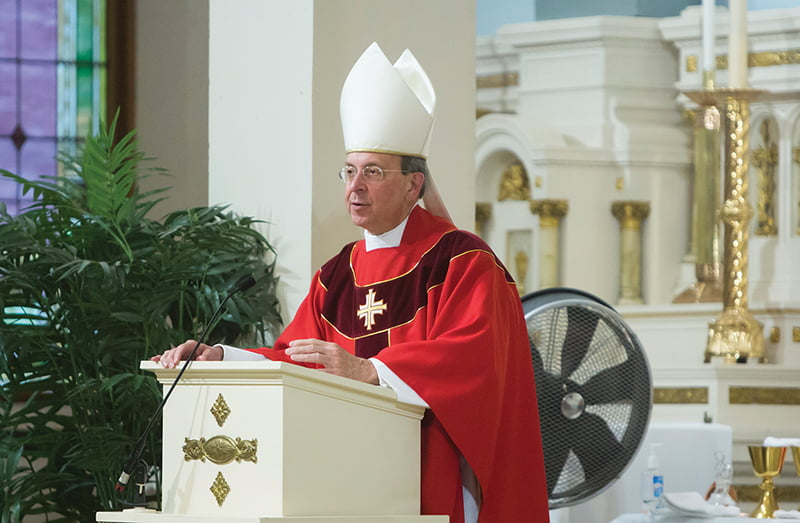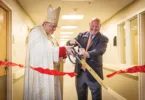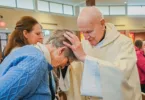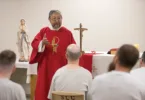
Archbishop William E. Lori of the Archdiocese of Baltimore delivers the homily at the Red Mass Oct. 3 at Our Lady of Sorrows Church in Kansas City, Missouri. LEAVEN PHOTO BY DOUG HESSE
by Joe Bollig
joe.bollig@theleaven.org
KANSAS CITY, Mo. — Members of the legal professions at the annual Red Mass were urged not only to be competent stewards of law and justice, but also to be disciples who are striving to live out their baptismal calling.
The Red Mass was celebrated on Nov. 3 at Our Lady of Sorrows Church in Kansas City, Missouri. Archbishop William E. Lori of the Archdiocese of Baltimore was the main celebrant and homilist. Archbishop Joseph F. Naumann concelebrated. The archbishops were joined at the altar by six priests and two deacons.
Bishop James V. Johnston of the Diocese of Kansas City-St. Joseph was unable to attend because he was on a Catholic Relief Services trip to India.
With roots reaching back to medieval France, the Red Mass is a time of prayer for judges, politicians, attorneys and all others involved in the legal professions. Traditionally, the Red Mass was celebrated at the opening of the court’s term.
Although the origin of the term “Red Mass” is obscure, it is thought to refer to the red robes of royal judges or the Holy Spirit. Today, the “red” is seen in the vestments of the celebrating clerics.
The Red Mass was sponsored by the Diocese of Kansas City-St. Joseph, the Archdiocese of Kansas City in Kansas, the Catholic Bar Association and the Catholic Lawyers Guild of Kansas City.
Many of those at the Red Mass were attending the Catholic Bar Association general assembly, held Nov. 2 to 4 at the Marriott Kansas City Downtown.
Joshua McCaig, president of the CBA and a shareholder of the Kansas City, Missouri-based law firm Polsinelli, organized the annual general assembly and Red Mass.
In his homily, Archbishop Lori spoke about America’s Founding Fathers as being “flawed human beings with moral blind spots” but said there was “a providential quality about their formation and achievements.”
“They came to embrace two convictions critical to a limited government that recognizes God-given rights, freedoms and responsibilities of its citizens,” said Archbishop Lori.
The first conviction is that human nature, although flawed, is rational and open to moral reasoning and truth — not of the relativist variety — and was not dependent on any particular religious denomination.
The second conviction is that religion, with its stress on morality and virtue, is good for human nature and society in general. As George Washington expressed it, there is an “indissoluble union between virtue and happiness.”
The Founders were realists about human nature and the quest for power, so they established a system that required the consent of the governed. And yet, they knew that self-government would require moral self-government, said the archbishop.
“None of the Founding Fathers mistook this freedom for licentiousness,” said Archbishop Lori. “Rather, they opened the way for a society in which institutions such as families, schools and churches would form citizens in those moral and civic virtues that would equip them for the responsibilities that come with limited self-government.”
The Founders realized that if moral and civic virtues failed, and human passions were given free rein, the great experiment of self-government would be endangered.
“I believe it was for this reason that the Founders valued religious freedom and came to enshrine it in the First Amendment [of the U.S. Constitution],” said the archbishop. “The Founders did not seek to marginalize religious faith, nor did they merely seek to neutralize religious disputes in society.”
Rather, he continued, they wanted to give churches the freedom to engage in forming the character of citizens for the sake of human dignity and the common good.
Archbishop Lori blessed and thanked the members of the legal professions for their “heroic labors and witness” and called upon them to model their lives on the Christ of the beatitudes.
“For you are not only officers of the court, but also agents of moral formation — for yourselves, your families, your colleagues and for the wider society,” said Archbishop Lori.
There was a social at the Marriott Kansas City Downtown following the Red Mass.






